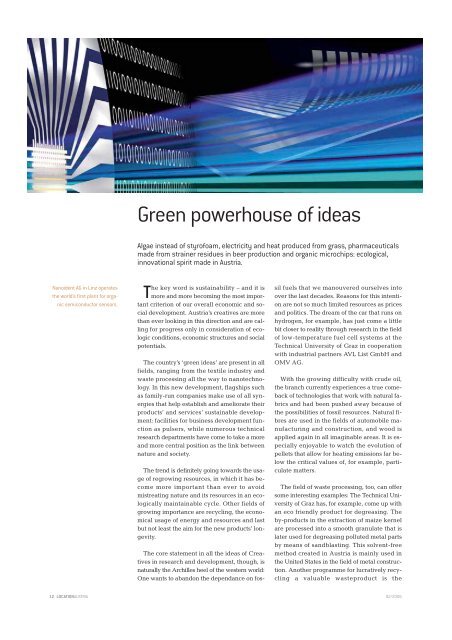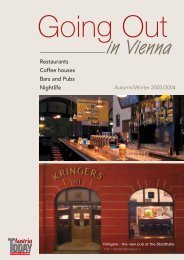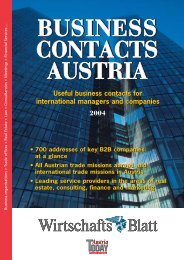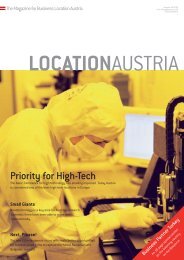Green Austria
Green Austria
Green Austria
Create successful ePaper yourself
Turn your PDF publications into a flip-book with our unique Google optimized e-Paper software.
Nanoident AG in Linz operates<br />
the world’s first plant for organic<br />
semiconductor sensors.<br />
<strong>Green</strong> powerhouse of ideas<br />
Algae instead of styrofoam, electricity and heat produced from grass, pharmaceuticals<br />
made from strainer residues in beer production and organic microchips: ecological,<br />
innovational spirit made in <strong>Austria</strong>.<br />
The key word is sustainability – and it is<br />
more and more becoming the most important<br />
criterion of our overall economic and social<br />
development. <strong>Austria</strong>’s creatives are more<br />
than ever looking in this direction and are calling<br />
for progress only in consideration of ecologic<br />
conditions, economic structures and social<br />
potentials.<br />
The country’s ‘green ideas’ are present in all<br />
fields, ranging from the textile industry and<br />
waste processing all the way to nanotechnology.<br />
In this new development, flagships such<br />
as family-run companies make use of all synergies<br />
that help establish and ameliorate their<br />
products’ and services’ sustainable development:<br />
facilities for business development function<br />
as pulsers, while numerous technical<br />
research departments have come to take a more<br />
and more central position as the link between<br />
nature and society.<br />
The trend is definitely going towards the usage<br />
of regrowing resources, in which it has become<br />
more important than ever to avoid<br />
mistreating nature and its resources in an ecologically<br />
maintainable cycle. Other fields of<br />
growing importance are recycling, the economical<br />
usage of energy and resources and last<br />
but not least the aim for the new products’ longevity.<br />
The core statement in all the ideas of Creatives<br />
in research and development, though, is<br />
naturally the Archilles heel of the western world:<br />
One wants to abandon the dependance on fos-<br />
sil fuels that we manouvered ourselves into<br />
over the last decades. Reasons for this intention<br />
are not so much limited resources as prices<br />
and politics. The dream of the car that runs on<br />
hydrogen, for example, has just come a little<br />
bit closer to reality through research in the field<br />
of low-temperature fuel cell systems at the<br />
Technical University of Graz in cooperation<br />
with industrial partners AVL List GmbH and<br />
OMV AG.<br />
With the growing difficulty with crude oil,<br />
the branch currently experiences a true comeback<br />
of technologies that work with natural fabrics<br />
and had been pushed away because of<br />
the possibilities of fossil resources. Natural fibres<br />
are used in the fields of automobile manufacturing<br />
and construction, and wood is<br />
applied again in all imaginable areas. It is especially<br />
enjoyable to watch the evolution of<br />
pellets that allow for heating emissions far below<br />
the critical values of, for example, particulate<br />
matters.<br />
The field of waste processing, too, can offer<br />
some interesting examples: The Technical University<br />
of Graz has, for example, come up with<br />
an eco friendly product for degreasing. The<br />
by-products in the extraction of maize kernel<br />
are processed into a smooth granulate that is<br />
later used for degreasing polluted metal parts<br />
by means of sandblasting. This solvent-free<br />
method created in <strong>Austria</strong> is mainly used in<br />
the United States in the field of metal construction.<br />
Another programme for lucratively recycling<br />
a valuable wasteproduct is the<br />
12 LOCATIONAUSTRIA 02/2006






